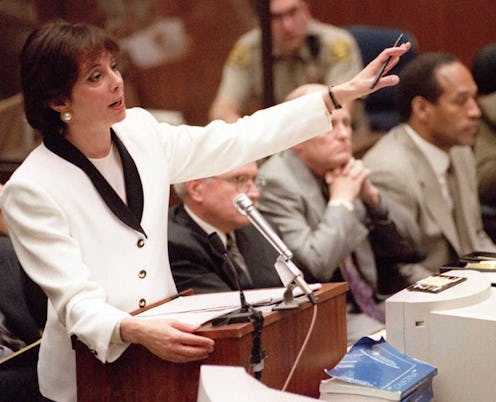Entertainment
'Crime Story' Shows The Real Struggles Women Face
It's safe to assume that prosecuting one of the most high-profile trials of the 20th century was no easy feat — but Marcia Clark, the lead prosecutor on the O.J. Simpson case was forced to contend with a myriad of additional struggles because of her gender. The March 8 episode of The People v. O.J. Simpson: American Crime Story rightfully placed a great deal of focus on the blatant sexism faced by Clark throughout the trial of the century. We saw her reduced to a tabloid punchline because of her haircut, while another paper published topless photos of her on vacation (yes, that really happened). As Clark tells her co-prosecutor Christopher Darden in Tuesday's episode, she wasn't a public figure and she was unprepared to be thrust into the spotlight. Though most women in the workforce mercifully don't have their hairstyles turned into tabloid fodder, Marcia Clark's struggle to manage her career and parenting obligations while confronted by a gendered double standard is probably something that hits close to home for many female viewers.
As we learned early on in the series, Clark was going through a divorce at the time of the trial. When "Marcia, Marcia, Marcia" begins, she and her ex-husband, Gordon Clark, are shown in a contentious custody hearing that causes her to be slightly late to Judge Ito's courtroom. She's met with smirks as she walks into the room, while Ito condescendingly tells her, "Glad you could join us, Ms. Clark" (which sounds a whole lot like chiding a high schooler for being late to class). This is only the beginning — throughout the episode, she becomes increasingly distressed and conflicted as the defense team throws curveballs that require her to pull all-nighters at the office and find last-minute childcare.
The workplace sexism becomes glaringly apparent when Johnnie Cochran requests that the prosecution's case be temporarily disrupted so a defense witness, Rosa Lopez, can testify before leaving the country. Ito dismisses the jury so a decision can be reached and warns everyone that it's going to be a late night. When Clark states that she can't stay late because she needs to take care of her children, Cochran says: "Are we really going to risk losing this witness because of a babysitting problem?"
Chalking up the struggles of a working mom to a "babysitting problem" is cringeworthy, but all too realistic. Clark is beyond dedicated to winning the case, but of course she's unwilling to compromise the welfare of her children — and, if she did so, I can only imagine the tabloid headlines that would have emerged within hours.
The next morning, Cochran says they should be able to complete Lopez's testimony within the day "barring any acts of God or child crises from Ms. Clark." Clark then stood up for herself in an admirable way:
I'm offended by his remarks. Mr. Cochran may not know what it's like to work a 70-hour work week and also take care of a family but I do and many other people do, too. To belittle my childcare issues in your courtroom is unconscionable and totally out of line.
Did this really happen? Like most aspects of the show, it stems from truth. In real life, Cochran accused Clark of using childcare as a "ploy" to buy preparation time before Lopez's testimony, as reported by SFGate.com. And, she called him out for it in real life as well, using similar dialogue: "I'm offended as a woman, as a single parent, as a prosecutor ... Some of us have child care issues and they are serious and they are paramount. Obviously, Mr. Cochran cannot understand that." The trial lasted for nine months and the Lopez incident is the only time the media reported that Clark had a childcare conflict — so it's fair to say she did an excellent job of working on an extremely difficult, high-profile case in her career while parenting amid a divorce and other stressful circumstances.
By portryaing moments like these, American Crime Story illustrates the offensive double standard faced by many working women. It often seems that working mothers are expected to feel guilty about spending time away from their children when often, as Clark reminds her ex-husband on the series, that is a necessity in order to support their children. And when it isn't financially necessary, women still have every right to choose to pursue a career because they want to, without being criticized for that decision.
Furthermore, Clark was the only female lawyer in the room and Cochran belittled her dilemma in an apparent effort to undermine her. (It wasn't the only time he did this in real life — Cochran also described Clark as "hysterical" during a tense day in court, according to Time, and again Clark stood up to him, calling his remark "sexist.")
Overall, the "Marcia, Marcia, Marcia" episode of American Crime Story paints an all-too-realistic picture of what many working women experience — they put their best efforts into both their careers and their parenting only to be made to feel like they've fallen short. And, while it's certainly true that many women place tremendous pressure on themselves, it needs to be acknowledged that peers, colleagues, and others can be quick to judge working mothers for either not being devoted enough to their jobs or to their children. Just like none of the male lawyers in the Simpson case were ridiculed in the media over a haircut, none of them faced judgement about their parenting styles.
